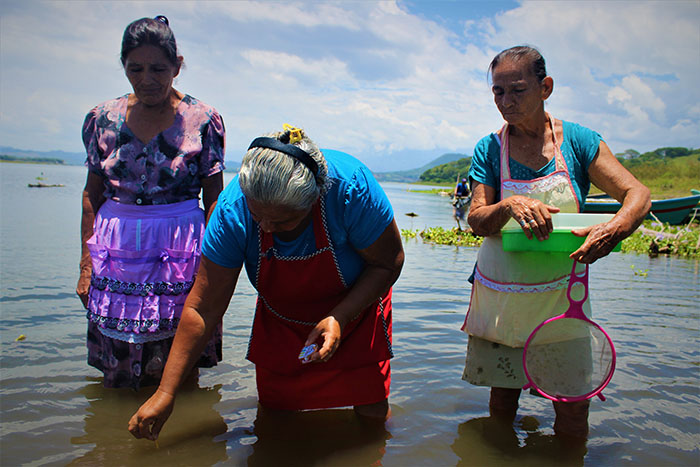 Cerro Blanco a mining project operated by Canadian company bluestone resources is located in the municipality of Asunción Mita, Guatemala. The Cerro Blanco mine could endanger the lives of more than half a million inhabitants due to the potential cross-border contamination of water sources.
Cerro Blanco a mining project operated by Canadian company bluestone resources is located in the municipality of Asunción Mita, Guatemala. The Cerro Blanco mine could endanger the lives of more than half a million inhabitants due to the potential cross-border contamination of water sources.
A study authored by biologist, Cidia Cortes in collaboration with the National Roundtable against Mining entitled "Impact of the Cerro Blanco Cross-Border Mine on Water and Health for El Salvador", highlights the reduction in the flow of water from the Ostúa River and the Guija Lake due to the enormous amount of thermal water extracted from the Cerro Blanco project.
A press release by the National Roundtable against Mining highlights that the first people to be affected by the mine will be rural women who utilize water from the Guajoyo ad Pita Floja Rivers, tributaries of the Guija Lake located in Santa Ana, El Salvador. According to the testimonies of local residents, Pita Floja is already experiencing difficulties due to the high content of toxic metals and the reduction of the water flow.
Both water streams above, provide water for the Guija Lake, the main head of the Lempa River.
“We have been observing and exploring the Cerro Blanco mine since 2007, when it was installed in the border area. From that moment, we expressed concerns that this underground mine is installed in the Ostúa-Metapán basin underground aquifer”, mentioned Cortes. Moreover, Cortes suggests that this project will generate impacts on the water supply of El Salvador, endangering the lives of the inhabitants, especially those inhabiting the border area.“
This study has yielded results on environmental impacts, ¨but more studies are needed to corroborate that the mine is already causing impacts in the underground aquifer that supplies the Ostúa River and the Guija Lake, located in the upper basin of the Lempa River,” added Cortes.
Rodolfo Calles, a member of the Central American Alliance against Mining (ACAFREMIN) and a member of the National Roundtable against Mining points out that “for us what is important is the preservation and conservation of the Lempa River. In that regard, it is necessary to ban metal mining in areas of potential cross border contamination. That will occur if the Cerro Blanco mine starts operating in the short term. The study constitutes a supporting tool to the work of the communities that will be directly affected and for the producers that live on the Lempa River”.
In this context, social organizations demand the Salvadoran State adopt measures that are appropriate and effective to prevent, reduce and control the impact of cross-border natural assets.
The study is pending publication in the coming months.
---------------
Translation: Giada Ferrucci
Translated from: http://acafremin.org/es/noticias-regionales/el-salvador/425-estudio-de-mineria-refleja-el-peligro-de-la-mina-cerro-blanco-2
